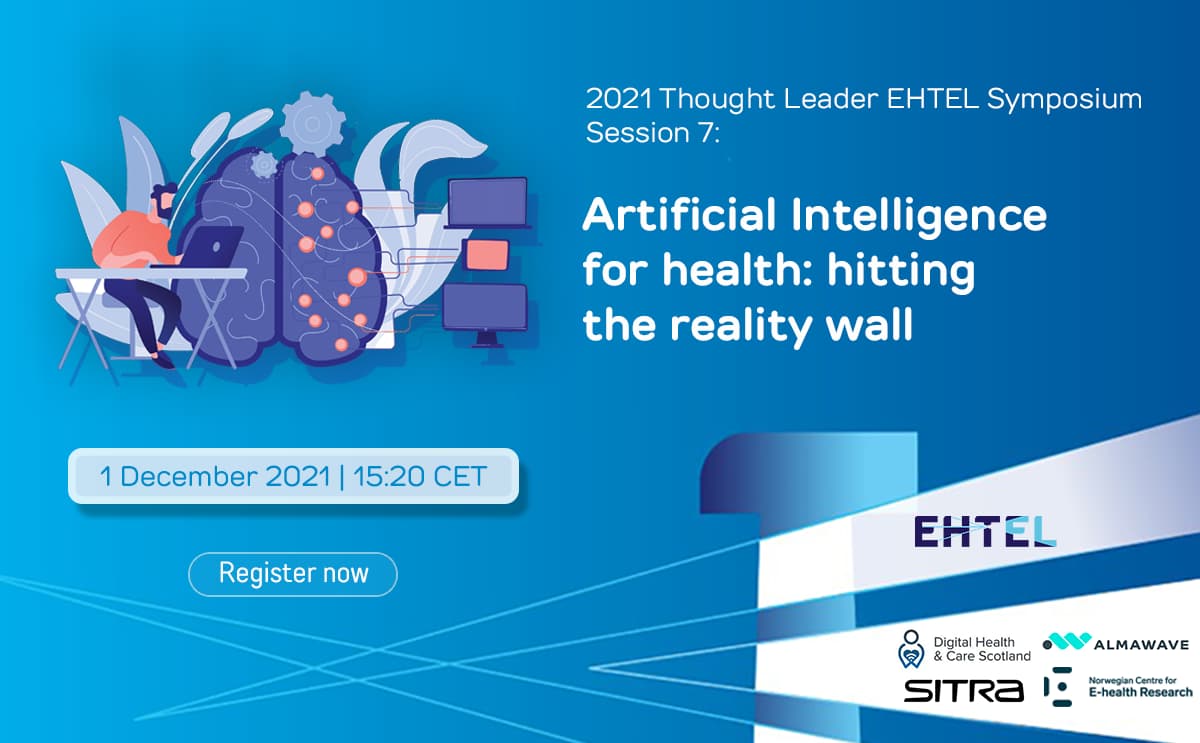
EHTEL Symposium 2021
Imagining a citizen-centric health data ecosystem
The EHTEL Symposium is bringing together virtually eHealth communities from all over the EU and beyond.
30 November – 1 December 2021
EHTEL is the one multi-stakeholder organisation within Europe that brings together organisations and individuals engaged in all aspects of eHealth. Its unique structure enables the exchange of ideas and information leading to innovation and improvement in the delivery of eHealth solutions and the transformation of health and social care. It does not lobby on behalf of particular groups but rather facilitates interaction between all of them
Session 7: Artificial Intelligence for health – Hitting the reality wall
Artificial intelligence (AI) offers opportunities for growth in efficiency in the domain of health and care. It provides a fast and smart means of crunching data. But many challenges still exist around the quality and volume of data collection, data processing, and data sharing. In spring 2021, in Europe, an AI Act proposal was published that outlines alerts against high-risk uses of AI and advocates the creation of codes of conduct on appropriate use of AI-related technologies. Training is one of those key issues and includes training of people about AI (whether health and care professionals or citizens), and training of the actual AI algorithms. The risk remains, however, whether – like Colossus of Rhodes – AI is built on “feet of clay”, particularly in relation to data quality and data relevance!
Some definite challenges remain, but there are also solutions on the horizon provided by companies, research projects and other initiatives, communities, and individuals. This session shows how both efficiency and ethics can be brought together in the very same AI-based applications.
Session Programme
► 15:20 CET Session Introduction
Dr. Rachelle Kaye, Assuta Medical Centers & Director of the EHTEL Board
Several challenges abound in relation to AI and data use. AI does not function well without lots of good data. To ensure good health and care, good quality, structured data is needed. When testing and using data, it needs to be valid and accurate, and use solid predictive tools. Hence, it is essential that AI companies and researchers start working with patients from a very early stage of collaboration, while bearing in mind exactly how they will need to train the AI algorithms that they plan to use. There are two ‘must-haves’: highly contextualised data, and highly motivated, involved people/patients.
► 15:35 CET Almawave’s one-to-many approach
Guido Panfili, Almawave, Italy
Almawave Italy has a one-to-many approach to AI and how it can help treat more patients. Almawave designs its AI by focusing on patients’ clinical pathways and how they are handled by clinicians. Its chief outcome is an aggregated tool that helps with prognosis of patients’ conditions and diseases. The system is called a clinical stability index (CSI). Patient data is harvested in a variety of ways, e.g., through mobile phones and recordings. Diseases that the system focuses on include breast and uterine cancers, and – today – Sars-Cov 2 (COVID-19). Through its easy-to-recognise scale(s), the CSI assists clinicians in helping more patients more quickly. Throughout, the citizen remains completely at the centre.
► 15:35 CET Developing AI in clinical settings
Dr. Rachelle Kaye, Assuta Medical Centers, Israel
Assuta, one of Israel’s private largest healthcare providers, is working with AI in clinical settings – it has therefore set up a new collaboration with Nvidia. It is enabling companies to collaborate with Assuta and use Assuta’s data for AI development. Working on AI in health and care means working with clinicians, developers, and researchers. Assuta’s innovation strategy is based on close collaboration with its clinicians, with industry, and its patients.
Prof. Panagiotis Bamidis, AUTH, Greece
European initiatives can lead to lots of learnings. CAPTAIN developed smart home appliances, software environments, and publicly available application programming interfaces. It had many experiences with the two ‘must-haves’: highly contextualised data, and highly motivated, involved people/patients. From the very start of its work on electronic coaching assistants for European older adults, CAPTAIN focused on design thinking and design action. In co-design approaches with older adults, it held sprints, scrums, and technical meetings. Organisationally, it involved in-depth work with living labs. Sophisticated technologies, including the Internet of Things, underpinned its four years of activity. Shifts occurred from work in lab settings to tests in real homes: homes, communities, and cities were at the fore. To quote: “Citizens should always be at the centre of any research or innovation activity … let’s design the smart future together.”
Guido Panfili, Almawave, Italy
Rachelle Kaye, Assuta, Israel
Panagiotis Bamidis, AUTH, Greece
Javier Sedano, ITCL Technology Centre, Spain from HosmartAI
Lyudmil Ninov, European Patients’ Forum
- How to collect, share, and use the data?
- What are the chief difficulties with AI that the fields of health and care are still facing?
- How willing would you be to share your data for AI processing in the face of strategic challenges like major pandemics (e.g., ongoing outbreaks of COVID-19)?
- How to put the end-user at the centre – whether health and care professionals, patients or citizens?
